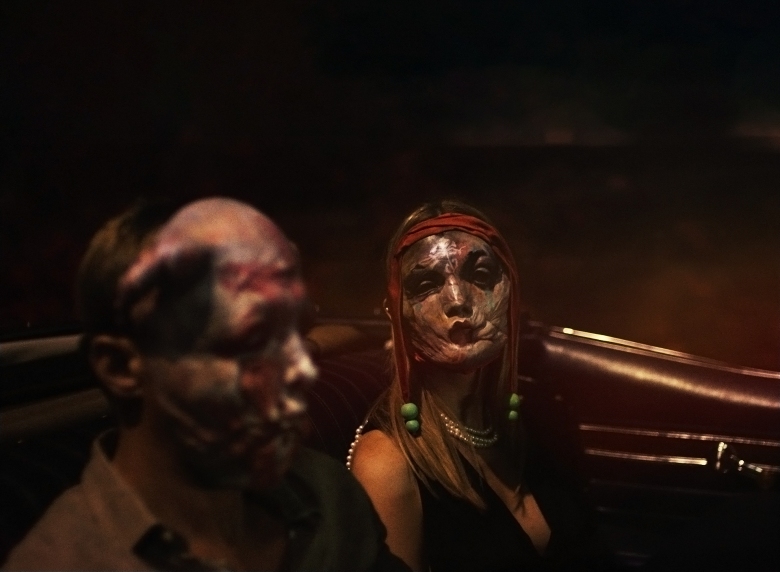Moral outrage may be in vogue and cancel culture always lurks, but sex was everywhere at this year’s Sundance. Last year’s edition had a few hot takes ranging from Emma Thompson’s empowering decision to bare all in the moving “Good Luck to You, Leo Grande” to Lena Dunham’s curious exploration of a ravenous teen’s post-hysterectomy horniness in “Sharp Stick.” This time, Sundance movies confronted sexuality through a darker, even tragic lens.
While mainstream American cinema still treats the subject as taboo – beyond a fleeting sequence in “Eternals,” no one gets down in a Marvel movie — our preeminent cinematic vessel for marginalized perspectives provided some bracing, somber alternatives, often tinged with acid-tongued humor.
From the moment the hotshot couple at the center of “Fair Play” sneak off to the bathroom for a quickie, only to wind up bathed in period blood, it’s clear that writer-director Chloe Domont isn’t here to sanitize her subject. In her taut debut, the power couple of Emily (Phoebe Dynevor) and Luke (Alden Ehrenreich) can’t seem to agree on who holds more power: Both work in a cutthroat financial firm that dominates their lives. When Emily gets promoted, and becomes Luke’s manager, the dynamic is clear to everyone but him.
“Fair Play” portrays the sleek corporate interiors of the high-stakes firm as kind of tribal battleground in which Emily challenges the gender bias in play: She’s willing to beat her chest alongside the hard-partying apes who swing through her office while Luke sinks into his cubicle. Much later in the movie, they find themselves in another bathroom and there’s no blood — just the violent deterioration of a physical connection ruptured by the primal nature of male desire. It’s a vivid illustration of a competitive ecosystem that demands work-life balance; when that barrier dissolves, they’re fucked.

“Fair Play”
Courtesy of Sundance Film Festival
Sex has a more liberating undercurrent in Ira Sachs’ “Passages,” though the veteran filmmaker uses a series of passionate encounters to illustrate the deterioration of romance. In the elegant, stripped-down story, Paris-based director Tomas (Franz Rogowski) cheats on his husband Martin (Ben Whishaw) with a young woman (Adele Exarchopoulos) whom he meets in a bar after his latest production. Tomas finds himself so energized by the tryst that he instantly brags about it to Martin, who reacts with understandable frustration. His head swirling with confusion, Tomas throws himself into another heated encounter with his new paramour, but grows weary of the connection once the potential for commitment comes in.
Later, a prolonged sex scene with Martin illustrates the degree to which Tomas feels most aroused by the person who provides an escape from his most stable surroundings. It’s the most unnerving portrait of sex as an escapist drug since Michael Fassbender’s downward spiral in “Shame,” as Tomas’ kink seems tied to any semblance of stability — it’s his kink, and he couldn’t escape it even if he tried.
In contrast to the sloppiness of these men and the way they choose to act on their basest needs, “Cat Person,” an adaptation of the viral New Yorker story, provides a sobering alternative. Director Susanna Fogel’s look at curious college girl Margot (Emilia Jones) who embarks on an uncomfortable series of dates with Robert (Nicholas Braun) takes a few unsettling turns as she contemplates whether he’s a psychopath. Reality and fiction blur in a series of discomfiting scenes that hover on the brink of a punchline, until you start to wonder whether she might be on to something.
“Cat Person” stumbles into a curious third act less sophisticated than the ambiguity leading up to it, but the movie never gets better than a cringe-worthy sex scene that finds Margot in constant debate with herself. Should she stop the queasy encounter or give the guy what he wants? Does she care about his feelings, or worry that he might snap? The result is an unprecedented blend of discomfort and slapstick comedy certain to generate debate, and many conversations about relatability.
Meanwhile, nothing embodies the sexually changed dance between freedom and danger more than the the graphic handjob that Gabby (Mia Goth) gives James (Alexander Skarsgard) in “Infinity Pool.” This bonkers midnight movie from sci-fi provocateur Brandon Cronenberg finds Skarsgard’s struggling writer on vacation in a fictional Eastern European country when Goth introduces him to a whole new world. It would take a lot more space to explain (or spoil) the intricacies of this innovative premise, but it involves watching your own clone get executed for crimes you commited. James’ arousal amounts to a form of self-obsession and sets him up for humiliation. “Infinity Pool” operates as a kind of surrealist class satire; like “Fair Play,” it integrates the power mechanics of sex in the context of desperation.

“Infinity Pool”
Neon
If any movie takes a sunnier perspective on the subject, it has to be the first half of Sebastian Silva’s hilarious “Rotting in the Sun.” Ever since the days of “Nasty Baby,” the Chilean director’s work has oscillated from frivolous comedy to shocking, subversive twists; the one at the center of this movie rivals only “Infinity Pool” for the best WTF moment of this year’s festival.
There are penises galore in “Rotting in the Sun,” which finds Silva playing a suicidal version of himself as he goes to a gay beach in Mexico to clear his mind. It’s there that he runs into real-life Instagram influencer Jordan Firstman, who won’t leave him alone. He wants them to write a show together, to hang out, and of course, to get naked. Firstman’s pursuit of sexual freedoms in tandem with upward mobility sits at the center of a movie calculated to deconstruct the danger of baring all online.
It’s a brilliant critique that grows more suspenseful as it moves along, but never at the expense of the underlying punchline. People may be awful, “Rotting in the Sun” argues, and the online era only accentuates our basest instincts, but the reckless abandon of naked men prancing through the frame dares you not to laugh.
While mainstream American cinema still treats the subject as taboo – beyond a fleeting sequence in “Eternals,” no one gets down in a Marvel movie — our preeminent cinematic vessel for marginalized perspectives provided some bracing, somber alternatives, often tinged with acid-tongued humor.
From the moment the hotshot couple at the center of “Fair Play” sneak off to the bathroom for a quickie, only to wind up bathed in period blood, it’s clear that writer-director Chloe Domont isn’t here to sanitize her subject. In her taut debut, the power couple of Emily (Phoebe Dynevor) and Luke (Alden Ehrenreich) can’t seem to agree on who holds more power: Both work in a cutthroat financial firm that dominates their lives. When Emily gets promoted, and becomes Luke’s manager, the dynamic is clear to everyone but him.
“Fair Play” portrays the sleek corporate interiors of the high-stakes firm as kind of tribal battleground in which Emily challenges the gender bias in play: She’s willing to beat her chest alongside the hard-partying apes who swing through her office while Luke sinks into his cubicle. Much later in the movie, they find themselves in another bathroom and there’s no blood — just the violent deterioration of a physical connection ruptured by the primal nature of male desire. It’s a vivid illustration of a competitive ecosystem that demands work-life balance; when that barrier dissolves, they’re fucked.

“Fair Play”
Courtesy of Sundance Film Festival
Sex has a more liberating undercurrent in Ira Sachs’ “Passages,” though the veteran filmmaker uses a series of passionate encounters to illustrate the deterioration of romance. In the elegant, stripped-down story, Paris-based director Tomas (Franz Rogowski) cheats on his husband Martin (Ben Whishaw) with a young woman (Adele Exarchopoulos) whom he meets in a bar after his latest production. Tomas finds himself so energized by the tryst that he instantly brags about it to Martin, who reacts with understandable frustration. His head swirling with confusion, Tomas throws himself into another heated encounter with his new paramour, but grows weary of the connection once the potential for commitment comes in.
Later, a prolonged sex scene with Martin illustrates the degree to which Tomas feels most aroused by the person who provides an escape from his most stable surroundings. It’s the most unnerving portrait of sex as an escapist drug since Michael Fassbender’s downward spiral in “Shame,” as Tomas’ kink seems tied to any semblance of stability — it’s his kink, and he couldn’t escape it even if he tried.
In contrast to the sloppiness of these men and the way they choose to act on their basest needs, “Cat Person,” an adaptation of the viral New Yorker story, provides a sobering alternative. Director Susanna Fogel’s look at curious college girl Margot (Emilia Jones) who embarks on an uncomfortable series of dates with Robert (Nicholas Braun) takes a few unsettling turns as she contemplates whether he’s a psychopath. Reality and fiction blur in a series of discomfiting scenes that hover on the brink of a punchline, until you start to wonder whether she might be on to something.
“Cat Person” stumbles into a curious third act less sophisticated than the ambiguity leading up to it, but the movie never gets better than a cringe-worthy sex scene that finds Margot in constant debate with herself. Should she stop the queasy encounter or give the guy what he wants? Does she care about his feelings, or worry that he might snap? The result is an unprecedented blend of discomfort and slapstick comedy certain to generate debate, and many conversations about relatability.
Meanwhile, nothing embodies the sexually changed dance between freedom and danger more than the the graphic handjob that Gabby (Mia Goth) gives James (Alexander Skarsgard) in “Infinity Pool.” This bonkers midnight movie from sci-fi provocateur Brandon Cronenberg finds Skarsgard’s struggling writer on vacation in a fictional Eastern European country when Goth introduces him to a whole new world. It would take a lot more space to explain (or spoil) the intricacies of this innovative premise, but it involves watching your own clone get executed for crimes you commited. James’ arousal amounts to a form of self-obsession and sets him up for humiliation. “Infinity Pool” operates as a kind of surrealist class satire; like “Fair Play,” it integrates the power mechanics of sex in the context of desperation.

“Infinity Pool”
Neon
If any movie takes a sunnier perspective on the subject, it has to be the first half of Sebastian Silva’s hilarious “Rotting in the Sun.” Ever since the days of “Nasty Baby,” the Chilean director’s work has oscillated from frivolous comedy to shocking, subversive twists; the one at the center of this movie rivals only “Infinity Pool” for the best WTF moment of this year’s festival.
There are penises galore in “Rotting in the Sun,” which finds Silva playing a suicidal version of himself as he goes to a gay beach in Mexico to clear his mind. It’s there that he runs into real-life Instagram influencer Jordan Firstman, who won’t leave him alone. He wants them to write a show together, to hang out, and of course, to get naked. Firstman’s pursuit of sexual freedoms in tandem with upward mobility sits at the center of a movie calculated to deconstruct the danger of baring all online.
It’s a brilliant critique that grows more suspenseful as it moves along, but never at the expense of the underlying punchline. People may be awful, “Rotting in the Sun” argues, and the online era only accentuates our basest instincts, but the reckless abandon of naked men prancing through the frame dares you not to laugh.

